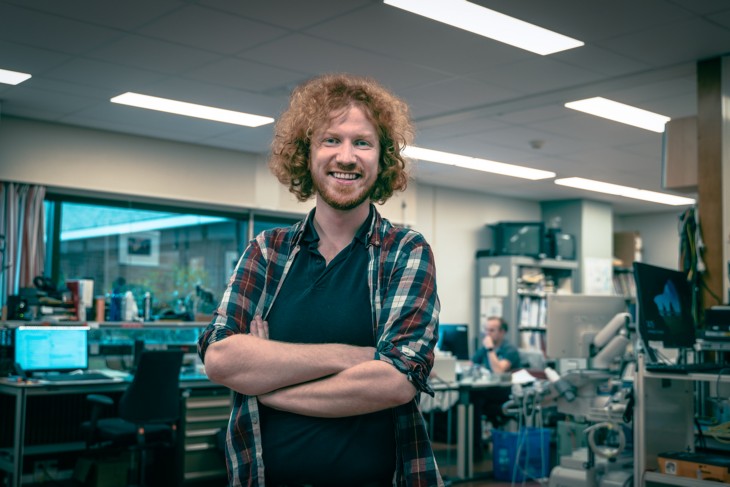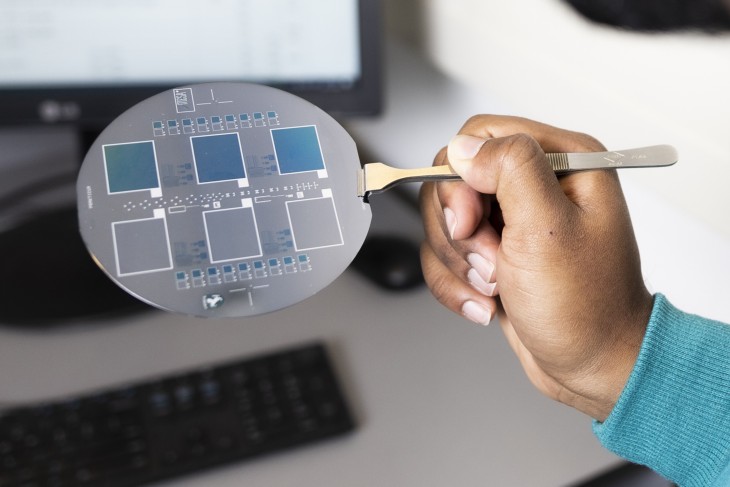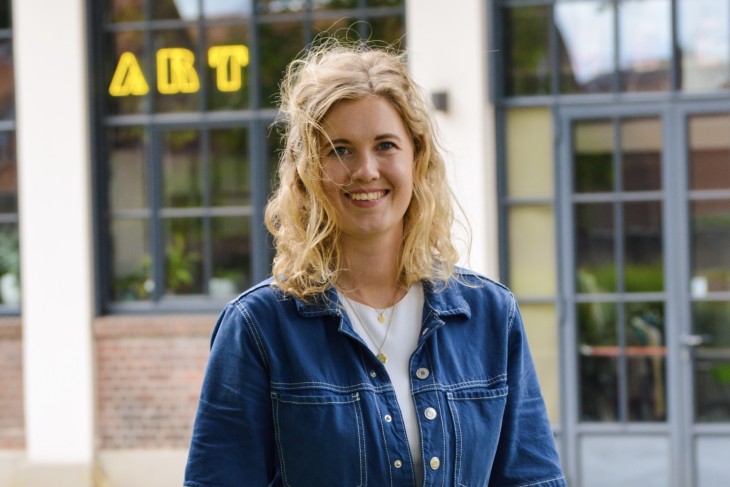Describe your student years in three words.
- Oğuz

Eye-opening, engaging, and fun.
Why eye-opening?
- Oğuz

It opened a whole new world for me. I had completed the Bachelor’s in Technical Computer Science at the University of Twente and had an affinity for software. The Master’s in Embedded Systems opened my eyes to what was possible beyond software, that is, hardware and everything in between. Gradually, I got interested in different subjects, so I took courses in digital signal processing, embedded AI, and cyber-physical systems. I love the flexibility the programme offers, you can focus on one or more areas based on your interests.
You are now a digital IC design engineer at Sencure. What do you do?
- Oğuz

I design the digital part of biomedical sensing chips. These are used in devices that measure human body signals, such as heartbeat. The spectrum of companies for which we make the chips is broad: they might be developing brain-computer interfaces, wearable patches that track asthma, in-ear fitness trackers, sensors monitoring a baby’s health during pregnancy, and many others.
A chip consists of two main parts: an analogue part that picks up the signals and a digital part that takes over. One of my main responsibilities and that of the team I lead is ensuring that it converts the signals into bits and sends the results to a processor. My team also tests different blocks: there is a block that starts up the chip and others that process the signals, and we have to make sure everything stays reliable under any circumstances.
What motivates you in your work?
- Oğuz

Recently, when my mother was hospitalised and needed an electrocardiogram, I pointed to the device and told her, “I design chips that are inside these kinds of electrocardiographs.” There is nothing more gratifying than designing chips for devices that help people.
Why did you choose this job?
- Oğuz

After my Master’s, I started a PhD at the University of Twente. The project I worked on was designing more power-efficient radar chips for cars. Eventually, NXP, a Dutch semiconductor manufacturing company, considered a few of my designs, and one made it to manufacturing. I was nearing the end of my PhD when a friend told me about the job opening at Sencure. I was enthusiastic to work at a company developing chips for patient monitoring and health tracking, and my background and skills were a perfect match.
What have you taken from Embedded Systems into your job?
- Oğuz

I learned to design efficient digital circuits, and this is what I do daily: designing a very fast but also tiny chip that uses little power. For example, one of the radar chip designs on which I worked during my PhD used 52% less power compared with a previous one while functioning in exactly the same way. Moreover, in my current job, I rely on what I learned in signal processing and maths, such as the Fourier transform, every single day.
And what did you learn on the job?
- Oğuz

I can design something and think it is perfect on paper, but once it is built, things behave differently. With software, if something breaks, I can fix the code and run it again, but with hardware, a mistake can cost us months and a lot of money. I am also learning more about the entire chip design process. I know how processors work and how software runs on those processors. But below that is the analogue part, and I want to understand that better. It is very technical, but it is also about people. I work together with analogue chip designers, and we must understand one another: knowing what someone is asking for and seeing a problem and a solution from their perspective.
What do you want to achieve professionally in 10 years?
- Oğuz

I would like to make the best chip: one that helps doctors diagnose patients earlier and saves lives. That would be the greatest gift for me.
What is your advice to students?
- Oğuz

There is such an abundance of companies looking for embedded systems graduates that you are in the privileged position to choose where to work. Your knowledge is your power, so put it to good use: try to make the world a better place for everyone.
Come study at the University of Twente
Did you like this article? Then you might find these study programmes interesting as well.
Related stories
 student GraduatesFrom student to biomedical engineer: “I keep hospital equipment safe and reliable.”Ben is a biomedical engineer at the ZGT hospital in Hengelo and Almelo. He completed the Master’s in Biomedical Engineering at the University of Twente.
student GraduatesFrom student to biomedical engineer: “I keep hospital equipment safe and reliable.”Ben is a biomedical engineer at the ZGT hospital in Hengelo and Almelo. He completed the Master’s in Biomedical Engineering at the University of Twente. student CareerLooking for a career in chiptech? These master's programmes will get you thereWorking in chip technology means contributing to one of the most advanced and fast-moving sectors in science and engineering. As chips become smaller, faster, and more powerful, the demand for skilled engineers and researchers continues to grow. Eager to enter the field, but still unsure which way to go? Here are 10 relevant master’s degrees you can pursue at the University of Twente.
student CareerLooking for a career in chiptech? These master's programmes will get you thereWorking in chip technology means contributing to one of the most advanced and fast-moving sectors in science and engineering. As chips become smaller, faster, and more powerful, the demand for skilled engineers and researchers continues to grow. Eager to enter the field, but still unsure which way to go? Here are 10 relevant master’s degrees you can pursue at the University of Twente. student GraduatesFrom student to packaging specialist: “I make food packaging sustainable.”Emmilie is a sustainable packaging specialist at Now New Next, a brand and design packaging agency. She completed the Master’s in Industrial Design Engineering at the University of Twente.
student GraduatesFrom student to packaging specialist: “I make food packaging sustainable.”Emmilie is a sustainable packaging specialist at Now New Next, a brand and design packaging agency. She completed the Master’s in Industrial Design Engineering at the University of Twente.

